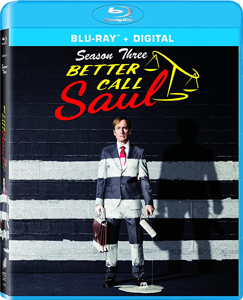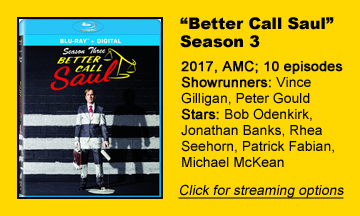With AMC’s “Breaking Bad” spinoff “Better Call Saul” set to air its sixth and final season later this year, we’re looking back at the first five seasons of Vince Gilligan’s second masterpiece series over five Thursdays. Next up is Season 3 (2017):
The prequel novelty
In 1999, I discovered the novelty of the prequel story with “Star Wars: Episode I – The Phantom Menace.” But it’s not until “Better Call Saul” Season 3 that I see how a prequel story should be done properly.
While the “Star Wars” prequels largely rely on the coolness factor of characters meeting for the first time or doing something that presages a famous event, “BCS” Season 3 makes the backstories of “Breaking Bad” players like Gus Fring (Giancarlo Esposito), Hector Salamanca (Mark Margolis), Lydia (Laura Fraser) and, of course, Jimmy (Bob Odenkirk) and Mike (Jonathan Banks) just as compelling as they’d be if we didn’t know the end point.
Ironically, because of the influx of familiar faces, Season 3 has me thinking more about the fates of non-“BB” characters Kim (Rhea Seehorn), Chuck (Michael McKean) and Nacho (Michael Mando). I haven’t mentioned them much in my earlier reviews, but I’ve thoroughly enjoyed them all since the beginning.
Kim and Jimmy
Kim-and-Jimmy is among the cutest mature relationships on TV (note Jimmy nursing Kim back to health after her car accident), as Gilligan’s writing team shows how they rub off on each other despite having different personalities and approaches to the law.
Kim is by the book, whereas Jimmy is willing to cut corners; when they meet in the middle and play their light con games on jerks at bars, Kim needs more convincing than Jimmy. But we can see how he might pull her down in the long run.
Still, as is the strength of the “BB”-verse, we also see how life – the law, regulations, financial pressures – can easily compel even a good person. For example, Jimmy is willing to take his one-year suspension from lawyering, pitch commercial production to break even on the ads he is forced to pull, and generally scratch and claw to pay his half of the office rent until he returns to the gig.
But the malpractice insurance company won’t give him a refund for his advance payment and, what’s more, his rate will increase 150 percent when he returns to the job.
Hard to hold high ground
We don’t merely understand why Jimmy will eventually break bad and work for black marketers; “BCS” demonstrates that it’s the logical choice. After a point, it doesn’t make sense to hold the moral high ground when society punishes you for it. Hard work and decency can in some way be their own reward, but if there isn’t a little more of a reward than that, you’re a chump in this world.
Decent people’s struggle to navigate a corrupt reality extends to Mike, who shakes hands with Gus in an “Anakin Skywalker, meet Obi-Wan Kenobi” type of moment. He needs his cash laundered (“BCS” illustrates money laundering so well that I don’t need to look it up in the dictionary anymore) for the sake of getting that money safely to his son’s family, who lost their non-corrupt police-officer breadwinner (Mike’s son) in the Drug War.
Right and wrong are so thoroughly intertwined on “BCS” that it’s hardly worth the effort to separate them in our minds. Another example is Nacho, who – thanks to a great calm-faced turn by Mando – is both a classic henchman and one who does not enjoy what he has to do (beating an underling who is short on a weekly payment, for example) to maintain his job and security.
The saga’s greatest villain, though (with apologies to Fring), is the ruthless Hector, so deliciously played by Margolis. Season 3 creates many intense moments around Hector getting angry, clutching his chest and popping a nitro pill.
Brother vs. brother
But above all, Season 3 is the tragic culmination of the saga of the two very different McGill brothers: The elder Chuck, who believes in the sanctity of the law, and Jimmy, who is so easy to like (I love how he earns the adoration of the old ladies at the Sandpiper estate) but who regularly takes five steps forward and 10 steps back in his career path.
Still, Chuck and Jimmy have one thing in common, something they share with almost every character on “BCS”: They are willing to fight for themselves, and they are clever about how they do so, often using the law as a weapon. Jimmy uses it against a community-service supervisor with his time and dignity at stake; Chuck uses it against his own firm with $8 million and his career at stake.
Season 3 is a masterful collection of narratives where a person’s smart action is followed by his enemy’s smarter action – so much so that I’m not bothered by it being noticeably more slow-burning than previous seasons.
Note long sequences such as Mike spying on drug dealers in the desert scrub, Nacho meticulously filling fake nitro pills, and the finally unhinged Chuck tearing up his house. “BCS” can honest-to-god make lawyers going through files and crunching numbers into gripping TV.
However, the smartest person doesn’t always come out on top on this show, because it’s set in reality, not on a playing field. Indeed, Jimmy is forced to set his own self up for a fall in order to restore a friendship between old ladies that he has crushed in pursuit of a different goal. The sequence is a perfect blend of funny and tragic.
“Better Call Saul” Season 3 understands not only that the world isn’t fair, but the specific reasons and circumstances that create the unfairness. Plus, I admit, those “Breaking Bad” tie-ins do add a coolness factor.
IMDb Top 250 trivia
- An epic, tragic Jimmy-Chuck clash makes “Chicanery” (5) the highest-rated episode up to this point at 9.7. Jimmy, having used Huell to plant a cellphone on his brother, tricks Chuck into ranting on the stand about how his medical condition is genuine. It spells the beginning of the end for Chuck’s storied law career.



